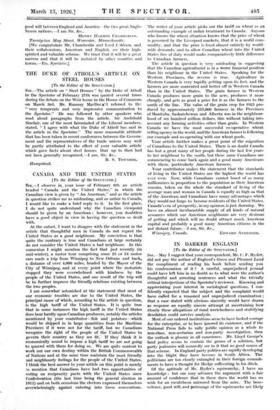CANADA AND THE UNITED STATES
[To the Editor of the SPECTATOR.] SIR,-1 observe in, your issue of February 6th an article headed "Canada and the United States," in which the Canadian view is given by " An American," and as the article in question strikes me as misleading, and as unfair to Canada, I would like to make a brief reply to it. In the first place, I do not quite understand why the Canadian viewpoint should be given by an American ; however, you doubtless have a good object in view in having the question so dealt with.
At the outset, I want to disagree with the statement in the article that thoughtful men in Canada do not regard the United States as a good neighbour. My conviction is that quite. the contrary is true and Canadians at large certainly do not consider the United States a bad neighbour. In this connexion I might mention the fact that just recently (in mid-winter), a motor tour comprising some 23 or 24 motor cars made a trip from Winnipeg to New Orleans and back, a distance of over 4,000 miles, headed by the Mayor of the City of Winnipeg, and at every point where the motorists stopped they were overwhelmed with kindness by the people of the United States, and one result of the trip will be to further improve the friendly relations existing between the two peoples.
I am somewhat astonished at the statement that most of our economic troubles are due to the United States, the principal cause of which, according to the article in question, is the high tariff of the United States. It is quite true that in some instances the high tariff in the United States does bear hardly upon Canadian producers, notably the articles .mentioned by your contributor—fish and potatoes—which would be shipped in in large quantities _from the Maritime Provinces if it were not for the tariff, but we Canadians recognize the right of the people of the United States to govein their country as they see fit. If they think it is economically sound to impose a high tariff we are not going to quarrel with them for doing so. We are quite content to work out our own destiny within the British Commonwealth of Nations and at the same time maintain the most friendly and neighbourly feelings for the people of the United States. I think the best answer to your article on this point is merely to mention that Canadians have had two opportunities of voting on reciprocity pacts with the United States since Confederation (the last time being the general election in 1911) and on both occasions the electors expressed themselves overwhelmingly against entering into these conventions. The writer of your article picks out the tariff on wheat as an outstanding example of unfair treatment to Canada. Anyone who knows the wheat situation knows that the price of wheat is governed by the Liverpool markets, that it is a world com- modity, and that the price is fixed almost entirely by world- wide demands, and to allow Canadian wheat into the United States free of duty would make comparatively little difference to Canadian farmers. • The article in question is very misleading in suggesting that the Canadian agriculturist is in a worse financial position than his neighbour in the United States. Speaking for the Western Provinces, the reverse is true. Agriculture in Western Canada is very rapidly getting upon its feet, and the farmers are more contented and better off in Western Canada than in the United States. The grain farmer in Western Canada produces more grain to the acre, produces it more cheaply, and gets as good a price for it as the farmers to the south of the line. The value of the grain crop for 1925 pro- duced by approximately 255,000 farmers in the Provinces of Manitoba, Saskatchewan and Alberta was in the neighbour- hood of six hundred million dollars, this without taking into account any farming activities other than grain. In Western Canada we have the most successful co-operative wheat selling agency in the world, and the American farmer is following our example and eo-operating'with our wheat pools.
Your article further makes a great point of the migration of Canadians to the United States. There is no doubt Canada has lost a great many of her people during the last few years to her neighbour to the south, but these same Canadians are commencing to come back again and a good many Americans with them, • particularly American farmers.
Your contributor makes the statement that the standards of living in the United States are the highest the world has ever seen. Now,. while Canadians cannot boast of as many millionaires in proportion to the population as their American cousins, taken on the whole the standard of living of the average man and woman in Canada is equally as high as that of the American, and Canadians have many advantages which they would not forgo to become residents of the United States. Canada's era of prosperity, in my opinion, is just dawning. We have an almost inexhaustible supply of all kinds of natural resources which our American neighbours are very desirous of getting and which will no doubt attract much American capital and probably a good many American citizens in the not distant future.—I am, Sir, &c.,






























































 Previous page
Previous page